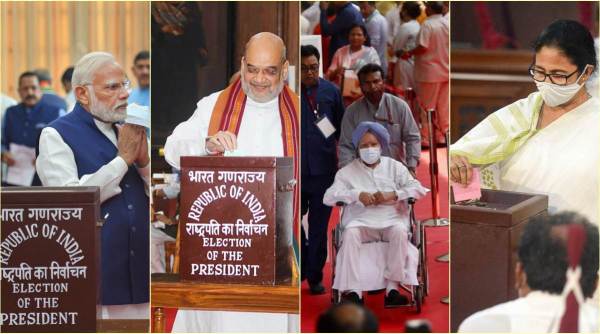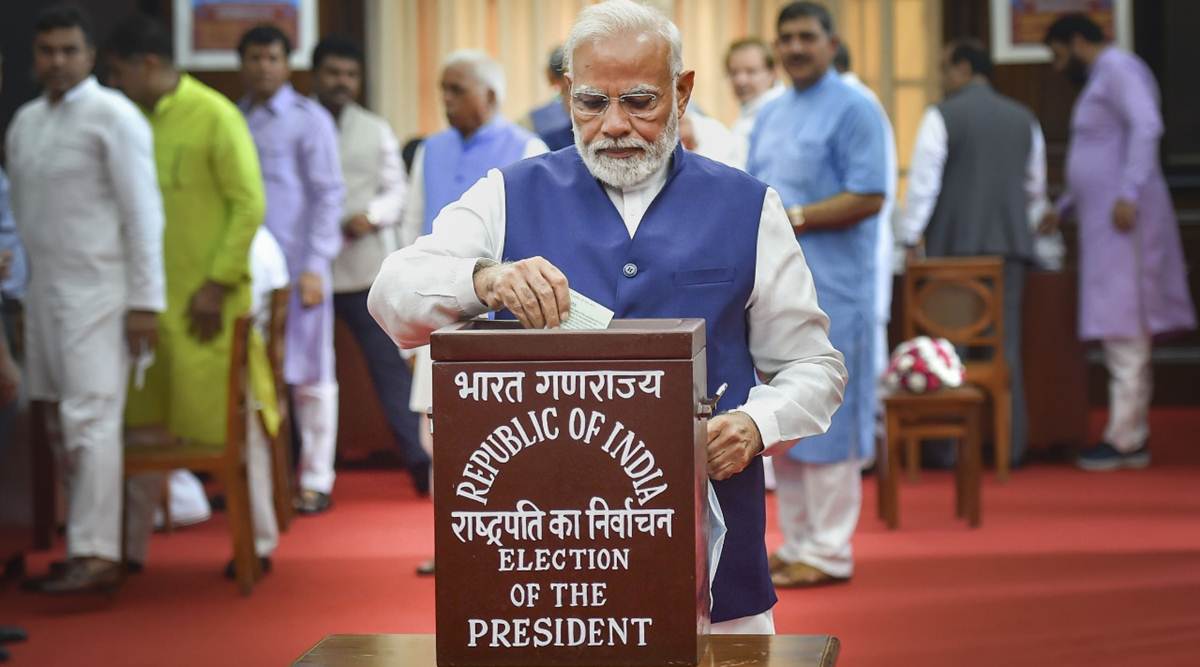Presidential Election 2022 Result Live Updates, July 21: Ballot boxes from all states have arrived at the Parliament House and poll officials are ready to begin counting in room number 63.

Presidential Election 2022 Result Live Updates: India will soon know who will succeed Ram Nath Kovind to become the country’s 15th President, with the counting of votes for the recently-held Presidential election commencing at the Parliament House on Thursday morning.
Going by the support extended by various parties, National Democratic Alliance (NDA) candidate Droupadi Murmu has a clear edge over Opposition’s Yashwant Sinha in this election. If elected, Murmu will become the first tribal woman to occupy the top constitutional post in the country.
Voting for the Presidential polls concluded on Monday with over 99 per cent of 4,796 eligible electors, including 771 MPs and 4,025 MLAs, taking part in the process.
Delhi | Counting of votes for Presidential election underway in Parliament pic.twitter.com/XBf84ADeEc
— ANI (@ANI) July 21, 2022
Amid the counting of votes in the presidential polls, Union Minister Kiren Rijiju said: “Not only tribals, but everyone in the country is going to have a sense of pride in having the 1st woman tribal President. I have learnt that all prominent tribal leaders will be coming to Delhi to greet the new likely to be President.” (ANI)
Announcing Yashwant Sinha‘s induction into the BJP at a press conference in 1993, senior leader L K Advani had described it as a “Diwali gift” for the party.
The former bureaucrat has travelled a long distance since, as has the party which he joined and where he thrived for a long time. Nurtured by Advani, picked to head the prestigious Finance and External Affairs Ministries in the Atal Bihari Vajpayee government of 1999 to 2004, Sinha who has reshaped his political profile since leaving the BJP under Narendra Modi has now emerged as the Opposition’s consensus candidate for the presidential elections.
I am grateful to Mamataji for the honour and prestige she bestowed on me in the TMC. Now a time has come when for a larger national cause I must step aside from the party to work for greater opposition unity. I am sure she approves of the step.
— Yashwant Sinha (@YashwantSinha) June 21, 2022
Announcing his resignation from the Trinamool Congress Tuesday, Sinha tweeted: “I am grateful to Mamataji for the honour and prestige she bestowed on me in the TMC. Now a time has come when for a larger national cause I must step aside from the party to work for greater opposition unity. I am sure she approves of the step.
The ballot boxes from across states were brought to Room Number 63 at the Parliament House, where the votes are being counted. Take a look at what it’s like outside the strongroom.
Counting of votes of #PresidentialElections2022 to get underway from 11am in Room 63 Parliament House, New Delhi today pic.twitter.com/btsvxlQ2rR
— Spokesperson ECI (@SpokespersonECI) July 21, 2022
On July 18, elected MLAs and MPs across the country will vote to elect India’s 15th President. Under Article 62(1) of the Constitution, “an election to fill a vacancy caused by the expiration of the term of office of President shall be completed before the expiration of the term”. President Ram Nath Kovind’s tenure ends on July 25.
A look at the process for electing the President, parties’ relative strengths currently, and how previous elections have played out.
What is the election process?
The President is elected by an electoral college consisting of MPs of both Houses of Parliament and MLAs of the states and Delhi and Puducherry. Nominated members of Rajya Sabha, Lok Sabha and the Assemblies, and members of state Legislative Councils, are not part of the electoral college.
With the counting of votes beginning promptly at 11 am, we are one step closer to knowing who will be the next President of India. Going by the support extended by various parties, National Democratic Alliance (NDA) candidate Droupadi Murmu has a clear edge over Opposition’s Yashwant Sinha in this election. If elected, Murmu will become the first tribal woman to occupy the top constitutional post in the country.
November 2016 marked a tumultuous period in Jharkhand. The Raghubar Das-led BJP government had passed amendments to two centuries-old land laws — the Chotanagpur Tenancy (CNT) and Santhal Pargana Tenancy (SPT) Acts — that would have ensured easy transfer of land for industrial use.
As the amendments led to massive protests by tribal communities across the state and with close to 200 delegations calling on then Governor Droupadi Murmu, eight months later, in June 2017, she returned the laws asking the government to clarify how the amendments would benefit tribals.
A key Raj Bhavan staffer who was privy to the events around that time says Murmu mulled over at the laws at a close-door meeting, at the end of which she made up her mind to send them back, saying, “Mere kalam se koi injustice nahi hoga (I will not let any injustice happen).”
As she sat it out for more than a year after her tenure as Governor, many in the BJP and outside predicted the end of the road for Murmu, a two-time former BJP MLA. Sources point to this incident of 2017 to say that Murmu, 64, now the NDA’s presidential candidate, and her “kalam (pen)” could be one to watch out for as she is set for a near-certain win in the July 18 presidential elections against the Opposition candidate Yashwant Sinha. A win would make Murmu India’s first tribal and second woman president.
Ahead of the counting of votes, NDA candidate Droupadi Murmu’s brother said that he was hopeful his sister would become the country’s next President. “There is an atmosphere of happiness here as we’re hopeful that Droupadi Murmu will become the next President of India. It’s a matter of pride for the tribal community, Odisha and the country,” Tarinisen Tudu told ANI.
Rairangpur | There is an atmosphere of happiness here as we're hopeful that Droupadi Murmu will become the next President of India. It's a matter of pride for the tribal community, Odisha & the country: Tarinisen Tudu, brother of NDA's Presidential candidate Droupadi Murmu pic.twitter.com/dvbbzQTvWr
— ANI (@ANI) July 21, 2022
Parliamentarians and legislators across the country voted Monday to elect the next President and by the time voting concluded, there were enough indications that NDA nominee Droupadi Murmu was set for an emphatic win against Opposition candidate Yashwant Sinha.
The Election Commission said: “As per reports being received, out of a total of 771 Members of Parliament entitled to vote (05 vacant) and similarly out of total 4025 Members of the Legislative Assemblies entitled to vote (06 vacant and 02 disqualified), over 99% cast their votes today. However, 100% voting by MLAs was reported from Chhattisgarh, Goa, Gujarat, Himachal Pradesh, Kerala, Karnataka, Madhya Pradesh, Manipur, Mizoram, Puducherry, Sikkim and Tamil Nadu.”

Explained: How the President of India is elected
On July 18, elected MLAs and MPs across the country will vote to elect India’s 15th President. Under Article 62(1) of the Constitution, “an election to fill a vacancy caused by the expiration of the term of office of President shall be completed before the expiration of the term”. President Ram Nath Kovind’s tenure ends on July 25.
A look at the process for electing the President, parties’ relative strengths currently, and how previous elections have played out.
What is the election process? The President is elected by an electoral college consisting of MPs of both Houses of Parliament and MLAs of the states and Delhi and Puducherry. Nominated members of Rajya Sabha, Lok Sabha and the Assemblies, and members of state Legislative Councils, are not part of the electoral college.
Elections over, Droupadi Murmu is a step closer to Rashtrapati Bhavan
Parliamentarians and legislators across the country voted Monday to elect the next President and by the time voting concluded, there were enough indications that NDA nominee Droupadi Murmu was set for an emphatic win against Opposition candidate Yashwant Sinha.
Votes will be counted on July 21 and the next President will take oath on July 25.
The Election Commission said: “As per reports being received, out of a total of 771 Members of Parliament entitled to vote (05 vacant) and similarly out of total 4025 Members of the Legislative Assemblies entitled to vote (06 vacant and 02 disqualified), over 99% cast their votes today. However, 100% voting by MLAs was reported from Chhattisgarh, Goa, Gujarat, Himachal Pradesh, Kerala, Karnataka, Madhya Pradesh, Manipur, Mizoram, Puducherry, Sikkim and Tamil Nadu.”
News Source : The Indian Express

